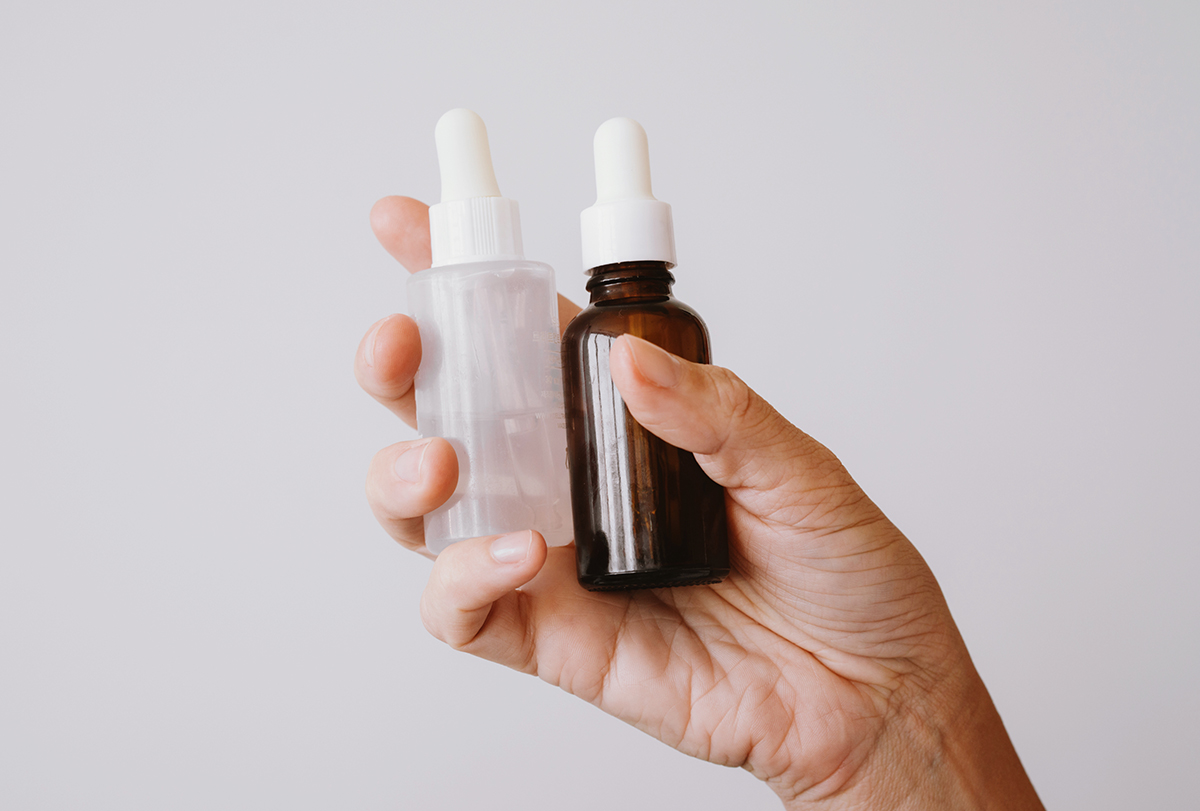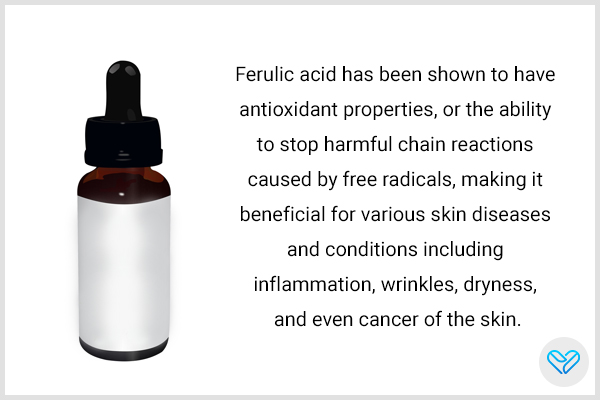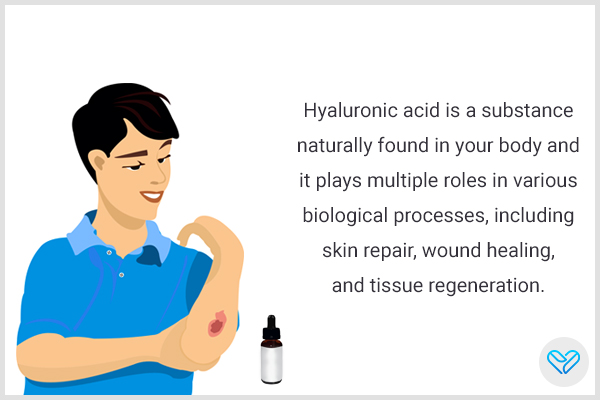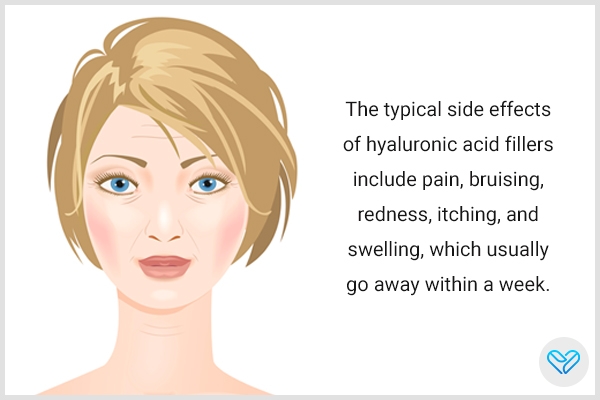In this article:
When you start researching skin care ingredients to find the right ones for you, you may realize that the countless options can be quite overwhelming.

Plus, some ingredients just stand out equally, putting you in a confusing position where you don’t know what to choose. Two such popular ingredients are ferulic acid and hyaluronic acid.
And when you sit and think about which one is better, a straight and simple answer may not come to your mind. That’s because there’s no one straightforward answer to it. Both ingredients deliver remarkable benefits to your skin and attend to different skin care issues.
In fact, a lot of people prefer using both ferulic and hyaluronic acid in their skin care regimen. Experts say that, if you haven’t been using either of the two, it is better to start with one, which is usually hyaluronic acid because of its hydrating properties.
This article will look into the world of skin care and dig through the benefits and uses of ferulic acid and hyaluronic acid to help you decide which one is better for you!
What to Choose: Ferulic Acid or Hyaluronic Acid?
Consider the following factors when choosing between ferulic acid and hyaluronic acid.
Oily skin
According to experts, ferulic acid is a better choice for oily skin because of its potent antioxidant action that fights free radical damage, which is more commonly seen in oily skin. (1)(2)
Dry skin
Hyaluronic acid is suggested for dry skin types because it profoundly hydrates the skin and has good moisture-retaining action, alleviating dryness. (3)
Acne-prone skin
Hyaluronic acid may be more helpful for fighting acne as it does not clog pores and it provides necessary hydration without aggravating acne issues. It also helps tone down and even out acne scars. (4)
Sensitive skin
Hyaluronic acid is gentler and, therefore, better suited for those with sensitive skin such as skin suffering from eczema. (5)
Age
Younger skin: Hyaluronic acid helps hydrate the skin, keeping it plump. It also prevents moisture loss and helps maintain great skin. (3)
Mature skin: Both ferulic acid and hyaluronic acid can help delay the development of skin aging signs. However, ferulic acid, being a powerful antioxidant, may offer a better antiaging action. (6)(7)
Sun damage
Ferulic acid is recommended for its probable role in repairing skin damage from sun rays and protecting against future harm from exposure to UV rays.
Hyaluronic acid is not bad at sun protection too. It can inhibit the appearance of signs of sun damage on the skin. (6)(8)
Ferulic Acid: Benefits and Side Effects
What is ferulic acid?

Ferulic acid is a natural compound widely distributed in the plant kingdom and has various applications in the pharmaceutical and skin care industries. It is particularly found in foods such as navy beans, corn bran, wheat bran, eggplant, artichokes, and beets.
Ferulic acid has been shown to have antioxidant properties, or the ability to stop harmful chain reactions caused by free radicals, making it beneficial for various skin diseases and conditions including inflammation, wrinkles, dryness, and even cancer of the skin. (1)(2)
Studies have explored the use of ferulic acid in topical skin care products, along with the technologies to enhance its effectiveness and stability. Combining ferulic acid with other vitamins and active ingredients has shown promising results, improving the performance and stability of the formulations. (2)
How is ferulic acid useful for the skin?
Ferulic acid can be useful for your skin in the following ways.
1. Promotes skin hydration and even complexion
One study found that a ferulic acid peel significantly improved skin hydration, keeping the skin moisturized and supple. Not only this, but the peel effectively reduced skin redness, resulting in a more even and uniform complexion. (6)
2. Tackles hyperpigmentation
Ferulic acid can help improve uneven skin tone by reducing the process of melanin generation (melanogenesis); melanin is the pigment responsible for skin color.
It also fades dark spots and evens out the skin tone, giving you a brighter complexion. (1)
3. Prevents premature skin aging
Skin aging is influenced by various factors such as the presence of reactive oxygen species (ROS) and DNA mutations, among other factors. Ferulic acid, a powerful antioxidant, helps neutralize free radicals and inhibit the synthesis of harmful substances in the skin.
Furthermore, it may help prevent glycation, a process that alters the skin’s elasticity and texture. Therefore, it can be considered a novel and effective treatment for premature skin aging. (6)(7)
4. Combats sun damage
Sun exposure can harm your skin, causing dark spots and premature aging. Research has shown that ferulic acid provides protection against harmful UV rays from the sun.
In fact, a study found that ferulic acid can enhance the efficacy of sunblock. (6)(8)
5. Manages skin inflammation
Ferulic acid has the capacity to decrease the inflammatory response of the skin. By soothing the skin, it can ameliorate irritation and dullness, thereby restoring the skin’s natural glow and brightness. (9)
Potential side effects of ferulic acid
Skin care products that contain ferulic acid are considered safe to use, according to experts. However, if you have known allergies to foods containing ferulic acid, it’s important to be cautious in its use.
Hyaluronic Acid: Benefits and Side Effects
What is hyaluronic acid?

Hyaluronic acid is a substance naturally found in your body and it plays multiple roles in various biological processes, including skin repair, wound healing, and tissue regeneration.
Hyaluronic acid is considered a valuable component in cosmetic developments because of its extraordinary advantages for skin health and appearance. It is available in several formulations, such as gels, creams, and serums. (10)
Research has shown that hyaluronic acid is important for skin moisture retention. It can be even used as filler injections or simply included in cosmetics for topical use.
Hyaluronic acid-based products have been found to improve skin moisturization, reduce signs of aging, and enhance skin elasticity. (3)
How is hyaluronic acid useful for the skin?
Hyaluronic acid can be beneficial for your skin in the following ways.
1. Hydrates and moisturizes the skin
Hyaluronic acid helps maintain proper skin hydration by binding to water molecules in the skin, and it can hold moisture a thousand times its volume.
It can hydrate both the outer surface and the inner layer of the skin. It does so by drawing water from the very deep layers of the skin to the external surface. This enables the skin to be hydrated and also prevents moisture loss. (3)
2. Improves skin elasticity
As age increases, the skin undergoes natural modifications such as weakened connections between collagen and elastic fibers, which can result in decreased firmness, the appearance of wrinkles, and reduced elasticity.
One important ingredient that can help in maintaining skin elasticity is hyaluronic acid, which does so by supporting the tiny blood vessels in the skin. (3)(11)
3. Promotes skin healing and repair
Hyaluronic acid has healing properties that make it useful in treating acute wounds such as burns. It can also aid in the healing of postsurgical scars by promoting faster wound closure.
A study that included 21 volunteers, mainly women, evaluated different skin repair creams and found that topical hyaluronic acid helped improve wound healing. (12)
4. Delays skin aging
Aging leads to a lot of skin problems. Exposure to UV radiation from the sun can further accelerate this process, resulting in premature aging of the skin. (13)
Hyaluronic acid plays a crucial role in preventing skin aging. By replenishing hyaluronic acid levels through skin care products or treatments, the impression of wrinkles, fine lines, and other indications of aging may be decreased, resulting in a more youthful and radiant complexion. (13)
Potential side effects of hyaluronic acid

The typical side effects of hyaluronic acid fillers include pain, bruising, redness, itching, and swelling, which usually go away within a week. (14)
Studies have also found that high concentrations or prolonged use of topical hyaluronic acid may cause mild skin reactions such as scaling, redness, and itching. (15)
How to Use Ferulic Acid or Hyaluronic Acid on Skin?
To use ferulic or hyaluronic acid topically, follow these steps:
- Cleanse your face with a mild cleanser.
- Put 2-3 drops of ferulic or hyaluronic acid serum on your fingers.
- Carefully pat the serum onto your face, concentrating on the uneven areas.
- Let it be absorbed for a few minutes.
- Apply a moisturizer to maintain skin hydration.
- Apply sunscreen during the day.
How to Use Ferulic Acid and Hyaluronic Acid Together?
They can be used together to reap positive skin effects. Combining the antioxidant action of ferulic acid and the hydrating powers of hyaluronic acid produces nothing short of magic.
To reap the synergistic effects of these ingredients, follow these steps:
- Wash your face with a mild cleanser.
- While your face is still slightly wet, apply a few drops of hyaluronic acid serum.
- Then apply a few drops of ferulic acid serum.
- Put on a moisturizer.
- Apply a generous layer of sunblock.
Most-Asked Questions
Can hyaluronic acid help with fine lines and wrinkles?
Yes, hyaluronic acid can plump up the skin and reduce the appearance of fine lines and wrinkles.
Is hyaluronic acid suitable for all skin types?
Yes, hyaluronic acid is suitable for all skin types, including sensitive skin.
Can ferulic acid help even out skin tone?
Yes, ferulic acid can help brighten the skin and improve uneven skin tone.
Can hyaluronic acid help with dry skin?
Yes, hyaluronic acid is great for hydrating dry skin and restoring moisture.
Can hyaluronic acid be used in combination with other skin care ingredients?
Yes, hyaluronic acid can be easily incorporated into your skin care routine and can be used alongside other products.
Final Word
Both ferulic acid and hyaluronic acid have their unique benefits and play different roles in skin care. Ferulic acid offers potent antioxidant protection and antiaging properties, while hyaluronic acid excels in hydrating and plumping the skin.
Incorporating both ingredients into a skin care routine can provide advantages for overall skin health. Remember to consult a skin care professional to determine the best approach for your specific needs.
- Was this article helpful?
- YES, THANKS!NOT REALLY


